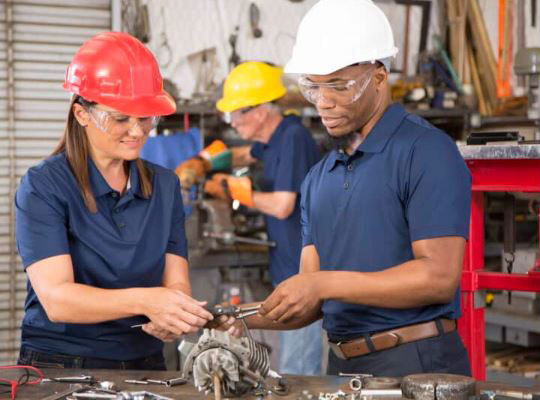Second Chance Employer Profile
The Manufacturing Institute

The Manufacturing Institute, the Washington, D.C.-headquartered nonprofit associated with the National Association of Manufacturers, has established itself as a leader in encouraging companies to embrace second chance hiring.
Among a variety of other initiatives, The Manufacturing Institute has cultivated second chance hiring through a series of case studies, pilot programs, research and webinars, in which more than 900 employers have participated.
The nonprofit began an initiative it calls Second Chance Office Hours in April 2021. The monthly virtual event, which will become quarterly in 2023, invites employers who want to know more about fair chance hiring to ask questions of the experts and compare experiences with other attendees. So far there have been seven office hour sessions with more than 100 participants.
In Spring 2023, TMI will release a toolkit highlighting what it has learned from the pilot programs it has conducted over the past year and a half (2021-2022).
Second chance hiring pilot programs
In a series of unique ventures, The Manufacturing Institute has created pilot programs with groups of employers and individual companies.
It all began in 2018 in San Antonio, where Toyotetsu Texas Inc. produces parts for Toyota’s Tundra and Tacoma trucks. Looking for a way to attract talent in a tight labor market, the company created a second chance program that has hired more than 80 employees. It then collaborated with five other companies in Bexar County – including Forma Automotive, Vutex and Toyoda Gosei – that wanted to begin a similar effort.
According to Pooja Tripathi, The Manufacturing Institute’s director, workforce initiatives, who helped launch the project with a previous employer, they created best practices as a result of what they learned from that initial pilot project.
These best practices include:
- Having a success coach or a case manager, “which helps second chance employees with retention,” Tripathi says. “We had a success coach that came through the workforce development board then was with Chrysalis Ministries (a nonprofit that provides case management services to those in reentry). We engaged Chrysalis to manage the program going forward. They check in with the individuals after they’ve been employed to see if any hurdles arise and help the individuals overcome them.”
- Using a common application form. Second chance applicants can use the same application form to apply to just one or all of the companies. “That way they don’t have to fill out six different applications,” says Tripathi. “We have included what bus routes these companies are on, in case they don’t have transportation.”
Eight companies in the Atlanta area and northern Georgia, including Georgia Pacific and Shaw Industries, are participating in a similar pilot project. Employer representatives were trained by the Dave’s Killer Bread Foundation in July 2022, and each is in a different stage of development, according to Tripathi.
The Manufacturing Institute was instrumental in helping three individual companies create their own pilot projects.
At Union Pacific, more than 80 people are in the program it launched in 2022. It’s currently active in seven locations with plans to expand to 17 systemwide. The two other companies that have created pilot projects are Malvern, Penn.-based building materials manufacturer Saint-Gobain NA and National Gypsum Co. a drywall gypsum board manufacturer with headquarters in Charlotte, NC and 17 plants in the U.S.
Although Office Hours and the pilot projects remain an important part of The Manufacturing Institute’s work, Tripathi says the organization is stepping back a bit and putting an emphasis on developing its toolkit.
“Getting this tool kit into place, so that these individual companies can understand second chance hiring Is important,” she says. “I want companies to institute second chance hiring but in a long-term sustainable way. Not just a quick fix. It’s very important for employers to understand what it takes to create a safe space for individuals to be incorporated into their workforce.”
